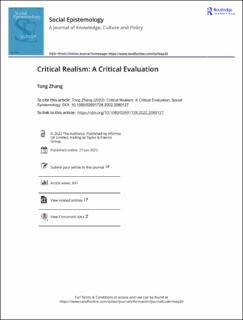| dc.contributor.author | Zhang, Tong | |
| dc.date.accessioned | 2022-09-26T07:24:57Z | |
| dc.date.available | 2022-09-26T07:24:57Z | |
| dc.date.created | 2022-08-10T13:42:07Z | |
| dc.date.issued | 2022 | |
| dc.identifier.citation | A Journal of Knowledge, Culture and Policy. 2022, Online First 21 June 2022 | en_US |
| dc.identifier.issn | 0269-1728 | |
| dc.identifier.uri | https://hdl.handle.net/11250/3021156 | |
| dc.description.abstract | Critical realism, championed by its proponents as the most promising post-positivist social science paradigm, has gained significant influence in the last few decades. This paper provides a critical evaluation of the critical realism movement in the hope of facilitating more fruitful dialogues between its proponents and rivalling schools of sociologists. Two concerns are raised about contemporary critical realism. First, critical realism is not the only philosophical school against positivism and not necessarily the best. Second, critical realists exaggerate the importance of critical realism to social science and conflate philosophy of science with sociological theories. | en_US |
| dc.language.iso | eng | en_US |
| dc.publisher | Taylor & Francis Online | en_US |
| dc.rights | Navngivelse 4.0 Internasjonal | * |
| dc.rights.uri | http://creativecommons.org/licenses/by/4.0/deed.no | * |
| dc.subject | Critical realism | en_US |
| dc.subject | Duhem- Quine thesis | en_US |
| dc.subject | interpretivism | en_US |
| dc.title | Critical Realism: A Critical Evaluation | en_US |
| dc.title.alternative | Critical Realism: A Critical Evaluation | en_US |
| dc.type | Peer reviewed | en_US |
| dc.type | Journal article | en_US |
| dc.description.version | publishedVersion | en_US |
| dc.rights.holder | Taylor & Francis Online | en_US |
| dc.source.journal | Social Epistemology | en_US |
| dc.identifier.doi | 10.1080/02691728.2022.2080127 | |
| dc.identifier.cristin | 2042230 | |
| cristin.ispublished | true | |
| cristin.fulltext | original | |
| cristin.qualitycode | 1 | |

